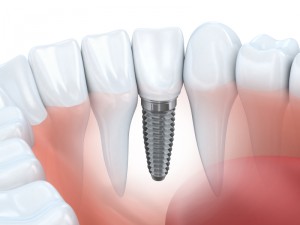
Missing one or more teeth can make life a bit of a pain. Your smile and your ability to eat and talk might not be the same as they were before you lost your teeth. Fortunately, dental implants offer a great way to replace your missing teeth and restore your ability to live your life to the fullest. However, there is a very small chance that your implant could fail. Let’s talk more about what to look for when it comes to a failed dental implant, and what your dentist can do to solve the problem.
What Are Dental Implants?
Dental implants are typically made up of three parts: a titanium post that is inserted into the jawbone, a crown that makes it look like a natural tooth, and an attachment called an abutment that connects the two. If one of these parts becomes loose or broken, it can cause issues with the whole structure.
After the metal post is inserted, it gradually fuses with the jawbone in a process called osseointegration. If this process doesn’t occur the way it should, problems can arise later on.
How Can I Tell If My Dental Implant Has Failed?
The first sign that something has gone wrong with an implant is if it feels loose. This may be a sign that the jawbone failed to grow around the implant post. If your implant feels wobbly and moves around when you talk or eat, contact your implant dentist right away. Pain, swelling, and infection may also be signs that your implant has failed to integrate, but not necessarily. Mobility is the most common symptom.
How Are Failed Dental Implants Treated?
Failure of a dental implant sounds scarier than it really is. Don’t worry; failure is common and can be easily treated. If your dentist determines that your implant needs to be replaced, the procedure can very likely be done with only a local anesthesia. He or she will remove the implant and clean the area. If the bone around the implant is damaged, you may require a bone graft to make sure the site is optimal for supporting an implant. It takes months to heal from a bone graft, but it will be well worth the wait when you receive your permanent tooth replacement.
How Can I Avoid Complications with My Dental Implant?
Before you get an implant placed, let your dentist know of any other medical conditions you may have. Some diseases, such as diabetes and HIV/AIDS, compromise your immune system and interfere with your body’s ability to perform osseointegration.
In addition, make sure to practice good oral hygiene habits, such as:
- Brushing your teeth and implant twice every day
- Flossing daily
- Quitting smoking
- Visiting your dentist every six months for checkups
Getting a dental implant should be a fairly simple procedure, but as with any procedure, there is always a chance of failure. However, there’s no need to worry as long as you take care of your oral health and see your dentist whenever you detect a problem.
About the Author
Dr. Willy Kassem has been named one of America’s top dentist many years in a row. He uses the most up-to-date materials to provide his patients in the Williamstown, NJ area with the most exceptional care possible. If you would like to replace your missing teeth with dental implants, contact Dr. Kassem at (856)-818-9998.




